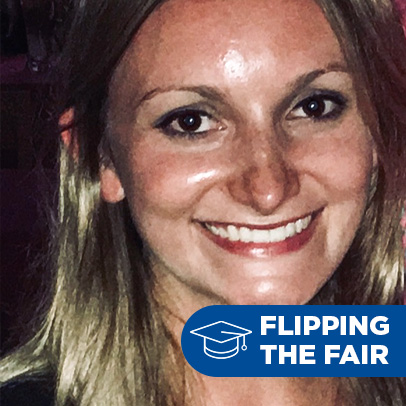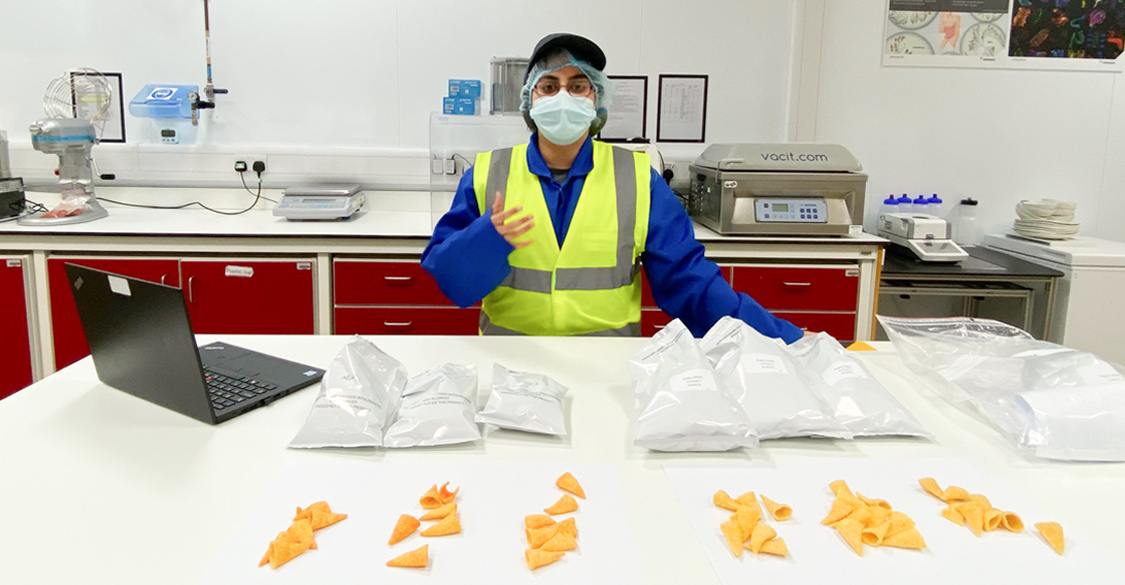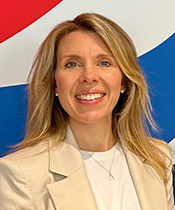Ever wonder how an idea becomes a package of chips or a can of soda? It takes a team.

R&D is the place to be
Get to know the ins and outs of Research and Development at PepsiCo with R&D associate engineer Elise Alexandra.
“We’re the science behind the business; we’re the team that makes things happen.
Elise Alexander
R&D engineer
Elise Alexander, an R&D engineer at PepsiCo, started her career as an intern and has since worked internationally, collaborated with food scientists and packaging experts, and analyzed the consumer market. And while she loves her day to day, it’s the culture that’s keeping her at PepsiCo. Hear how having fun at work is helping her thrive on the “Flipping the Fair: The Career Fair, Reinvented” podcast.
John Palumbo (host): Hey, everyone. Welcome to PepsiCo’s Flipping The Fair, The Career Fair Reinvented Podcast. I’m your host, John Palumbo.
For the past couple episodes, we’ve discussed entry-level positions at PepsiCo, including supply chain management and sales. For this episode, we wanted to talk about another great entry-level opportunity at PepsiCo, and that’s research and development, which is called R&D for short, as many of you know. Just like in the previous two episodes, we decided that the perfect person to speak to about this was someone who is new, but not too new to PepsiCo, since they could talk about what it was like when they first started out, as well as discuss some of their work experiences and growth opportunities.
That being said, my guest today is R&D associate engineer, Elise Alexander, who began working in R&D at PepsiCo about two years ago and was an intern prior to that. Hi, Elise. Thanks for being here.
Elise Alexander (R&D engineer): Hey, John. Thanks for having me.
John Palumbo: I’d love to start out, Elise, by having you provide our listeners with an overview of the R&D function at PepsiCo, as well as a little bit about you personally, your role and your responsibilities.
Elise Alexander: Absolutely, John. I grew up in Westchester, New York. I lived in New York all my life. I went to Manhattan College for my bachelor’s in chemical engineering.
While I was an undergrad, I completed two internships with PepsiCo. My first was more of a co-op my junior year. My second was a part of the official summer internship program, and that was going into my senior year. Both internships were in R&D, so I got the chance to work on different teams and really get to see what R&D was like at PepsiCo.
My first position was on the project management team for our coffee partnership with Starbucks, which is a great opportunity to learn about all the functions within R&D, since I was leading project timelines with all of our cross-functional partners.
My second position was with the team I’m currently working full-time on now, and that is commercialization engineering. I’ll talk about what commercialization means in R&D as a whole.
John Palumbo: Great.
Elise Alexander: Commercialization basically means bringing products to life from the bench to a large scale. We work on many brands, and we’re a key part of new innovations to make sure that our plants can manufacture these products safely. So we work pretty closely with our operations team, both in our small pilot plant on campus in New York and with our larger production plants worldwide. As engineers, we set all the requirements for beverage processing, which includes batching, where we actually take all the ingredients and flavors and put them together and filling beverages on the line.
Now that sounds simple, but there’s actually a lot of science behind making beverages-
John Palumbo: I bet.
Elise Alexander: … and there are ingredients that can interact negatively with one another. There’s the risk of creating beverages without preservatives and where you have micro growth. That requires a special thermal process, which can actually kill anything that can form in the beverage.
Anyway, I’m getting too technical, but that’s what R&D is. We’re the science behind the business, we’re the team that makes things happen. And without R&D, honestly, there wouldn’t be anything on the shelves. That’s why R&D is such a big deal, and we have a big function where each team is responsible for their own piece of the giant puzzle.
John Palumbo: No, that’s great. Can you give the students listening maybe some details about a job in R&D at PepsiCo? Things like maybe what the job entails, what they could expect, activities they might participate in, the qualifications they need.
Elise Alexander: Of course. Sure. I work on the commercialization engineering team, but our team also works very closely with product development, so mainly those folks have food science degrees. We work with packaging engineers, flavorists, quality, regulatory, food safety. I mean, the list goes on. But all of these teams are based out of Westchester, New York, where we are currently actually expanding our R&D campus.
New York is home to our global headquarters, and we communicate a lot with these functions there at a business level, but we own the beverage R&D business in New York. In Plano, Texas, you can find our snacks R&D folks. In Barrington, Illinois, we have more engineers and R&D friends there working on Quaker and Gatorade products to name a few. So there’s a lot of opportunity to work in different locations across so many brands.
For example, I work on beverages like Mountain Dew, Pure Leaf and, of course, Pepsi. There’s always some type of unique challenge to work through on each project. Even if it’s a brand you’ve worked on before, we have to change it up to keep our consumers interested. The big wave right now is being healthy and consumers wanting less calories, so that’s new for us. We have to reformulate to make these stable beverages without sugar and with the clean label. Or let’s say the business team has a crazy idea for a new flavor, and you have to go through the steps to make it happen in record time. I think that’s the best part of the job. And, of course, working on the best team. I mean, commercialization is great, no offense to anyone else.
As engineers and scientists at PepsiCo, we travel quite a bit to our domestic and international plants around the world. Personally, I’ve been to Ireland and Canada. I’m still waiting to go to plants in Singapore and the Philippines and Thailand, like all my coworkers, but I can’t do that for right now. For those listening, we’re in the midst of this global pandemic with the coronavirus, so that’s disrupted travel a bit. But it’s okay, we’re getting through it.
Anyway, in the US alone, we have a countless number of plants that have brought me to the West Coast for the first time, I have to say. That was really an incredible experience being able to take some time once we were done and explore that part of the world. It’s such an amazing learning experience just to see how our products are made and sold after all the development work, seeing it come to life and run on the line. Then once the products launch, seeing them on the shelf, really such a great feeling. Then, of course, there’s the bragging rights that come with it.
John Palumbo: Right, right. It’s got to be very satisfying. I’m a big fan of kind of rewinding a bit and going back to the beginning. That said, can you take us back to when you were looking for a job? What made you choose PepsiCo and, more specifically, an R&D role?
Elise Alexander: Yeah, sure. For me, it’s a big part of my curriculum at school for chemical engineering was directed more towards entering the oil industry, and I wasn’t interested in that. We were lucky as undergrads and got the chance to visit these refineries and pharma plants, but I still just didn’t know what industry I wanted to enter. But what I did know is I didn’t want to be solving Bernoulli equations all day, and I wanted to step away from that traditional chemical engineering material and do something a bit more fun. So I figured I can use my technical background to solve problems, rather than any of the concrete engineering I went to school for.
It sounds a little backwards, but that’s the case for a lot of engineers I work with at PepsiCo, and having this degree just opens up the door to doing so much more, even outside of engineering. Engineers I work with at PepsiCo, they end up as project managers or entering business roles. They can even move into other technical roles like packaging and product development.
So to rewind, when I was looking for internships, I landed upon PepsiCo, which is, obviously, a company I’ve heard about before. I was lucky that I lived in the area already, and then there’s always your parent’s friend’s cousin who have worked there-
John Palumbo: Oh, right.
Elise Alexander: … and say great things about it.
So I thought I would apply, wasn’t expecting to hear anything back, but here’s a funny story. Now, this summer I was a rising junior in school, I was worried I didn’t have an internship already because there’s so much pressure at school to land one. I decided to study abroad instead. I took a course in Ireland, which I highly recommend studying abroad if you’re able to in school.
But while I was there, now granted it’s a five-hour time difference, so it was actually 9:30 PM, and I was in this cafe with my classmates and I got a call from back home, so I took it. It ended up being the hiring manager for the internship I applied to at PepsiCo. He wanted to have a quick chat, which actually turned into a phone interview and to invite me back onsite once I got back. So I sprinted to the bathroom so it was more quiet, I took the call from there, and it was just a pretty wild story.
But anyway, I got home, it was mid-summer and I started the internship, which continued on into my fall semester part-time since I was going to school locally. Just from that experience, I fell in love with the company, people. It just felt right.
That’s why when I heard PepsiCo was coming on campus my junior year to recruit for the next summer, I signed right up. I already had that foot in the door, they knew who I was, so that helped tremendously. But the idea of coming back on a different team just really opened my eyes to what exactly I would be doing once I graduated, and I found that super helpful.
I learned so much in these internships. Really, I think the most important part is not only for the company to be reviewing you and your skills, but for you as the intern to be reviewing the company, to see if this is a place where you want to end up, where you want to work full-time after you graduate.
John Palumbo: That’s a great point, yup.
Elise Alexander: And it just allows you to gain a real-life application of what someone with your major can do. Plus you gain professionalism and networking skills, really getting your name out there. Because if you get a full-time offer from your internship, which is honestly more common than not, and PepsiCo is really good about giving offers, and it’s important that people remember you when you come back. I didn’t even know what R&D was until I started as an intern, and I learned right away it was so fun and rewarding and a great field to be in. That’s why I decided to come back full time. I really found my home here, and I’m forever grateful for that call I received while I was in Ireland.
John Palumbo: That’s great. That’s a great story.
I realized that, and this is different for everybody and it might not play out this way for the students who are listening, but could you provide them with a picture or a snapshot of maybe what the first six months or a year of their job working at PepsiCo in R&D might look like? And, by the way, don’t feel like you need to make it sound like Shangri-La here. I mean, we want to hear the good, the bad and the ugly from you.
Elise Alexander: All right. You got it. The first year on the job, I mean, for reference, I’m about to hit my second-year milestone, so I’m going to rewind a little bit as to where I was at that point in time during my first year.
John Palumbo: Great.
Elise Alexander: Obviously, during an entire year, you learn and see so much more than any summer internship. During that year I was meeting people I hadn’t had the chance to meet that summer and really just learning everything I could, since you don’t typically take courses in college regarding beverage processing for chemical engineering, unless maybe you’re a food science major, I don’t know, so that was a lot. I knew nothing about food science, but we worked so closely with those teams. As engineers, you have to know the science behind it all, so that was really interesting to me.
There’s, of course, a lot of documentation you have to do, the nitty gritty, but that’s any job. And I learned that I have a great team of co-workers who really took me under their wing and trained me so well.
The most exciting part, though, of that first year is gaining that competency and proving yourself. I had the chance to lead my first plant trial. What that means is you’re visiting a manufacturing plant to scale up one of the products that you’re working on. That was a big step in my career and since then, I’ve been to a dozen plants.
Of course, you learn it isn’t always glamorous. I mean, we’re, literally, wearing hair nets and steel-toed boots and on our feet for hours in these loud plants. But, honestly, I’d rather do that than sit in a cube from 9:00 to 5:00 every single day. I’d rather have fun and do something different.
My first year I really got to establish that balance and live the life of a true engineer, and I got to solve problems and learn from them. Now I continue to use those lessons in my current projects.
John Palumbo: Yeah, that’s great. Obviously, there’s no such thing as a typical workday. It definitely sounds like there’s no such thing as that as you’re talking because you never know what’s going to pop up. But can you walk through maybe what a workday looks like for you?
Elise Alexander: Yeah, let’s see. I mean, we do a lot of documentation for beverages globally, which is really cool to see types of beverages that we’re launching worldwide because each region kind of has a different taste, and they like certain products that other regions might not. So that’s really cool to see just how wide our portfolio is.
We also work downstairs in our pilot plant. Once our product development partners have a formula ready to use, we make a larger batch of it and focus really on how much water we’re using, what temperatures, what mixing speeds are ideal and so on. That’s really the job of an engineer.
Then, of course, there are the meetings and the weekly conference calls for each project talking about next steps. Where we get involved mainly is scheduling these plant trials with our bottlers and assessing new plants to make sure they have the capabilities that we need. We set up timelines and protocols for the plants to review. We walk them through what is different maybe about making this beverage compared to what they’ve done before.
Besides all the technical work, though, related to our job, there’s also so many opportunities to just have fun at work. I got a glimpse of this as an intern because they really roll out the red carpet for you and create so many events for you during your summer.
But now being a full-time employee, you can get involved in what we call ERGs, which are Employee Resource Groups. You can compare these kind of to the clubs and activities that you have at college, those extracurriculars.
But this is truly one of my favorite parts of work, actually, is even though I’m an engineer, I’m supposed to be the super technical nerd, but truly I’m a people person, and this has allowed me to get involved in the great events that we lead. I mean, this is what has brought me to sitting here today with you, John, and recording this awesome podcast.
I’m involved heavily in the intern program and what we call the Connect Employee Resource Group, where we lead quarterly connect with coffees with the young professionals and new hires in the organization. We have summer barbecues and such, and we have great volunteer opportunities like meal packing. We have an annual employee appreciation week, so I’ve been involved in organizing events for that for our campus. I mean, we brought in therapy dogs, so that’s super fun.
I just love being a part of a company that lets us have fun at work and allows me to offer this different set of skills and to let us have that release and balance of technical work and the fun stuff. I’d say R&D as a whole is really good about throwing some great events. There’s always free food somewhere, which is a blessing, of course.
John Palumbo: It never hurts.
Elise Alexander: It’s just great to get the whole campus together and show what we can as a team.
John Palumbo: Well, Elise, thank you so much. Thanks so much for the time, the information. I really think you gave the listeners a great glimpse into what it’s like working in R&D at PepsiCo. Thank you.
Elise Alexander: Awesome. Well, thank you so much for having me, John. Glad it could be helpful.
John Palumbo: For those of you listening, we hope this episode gave you some unique insight into the PepsiCo culture and armed you with some information about a job in R&D. If you like what you heard and you’re interested in PepsiCo, and you want to stay connected, click on the link in the episode description.
This concludes our limited run of the Flipping The Fair Series. As you know, our goal was to flip the career fair by turning it into a podcast that you could listen to at your convenience, without all the pressure and awkwardness you might potentially experience when hitting a traditional career fair event.
We hope we were able to give you a genuine glimpse into PepsiCo and provide you with information about some of the positions available to you. Whether you choose a career at PepsiCo or another company, we wanted to say thank you for considering us, and we wish you the best of luck in all your future endeavors. Thanks so much for listening.





